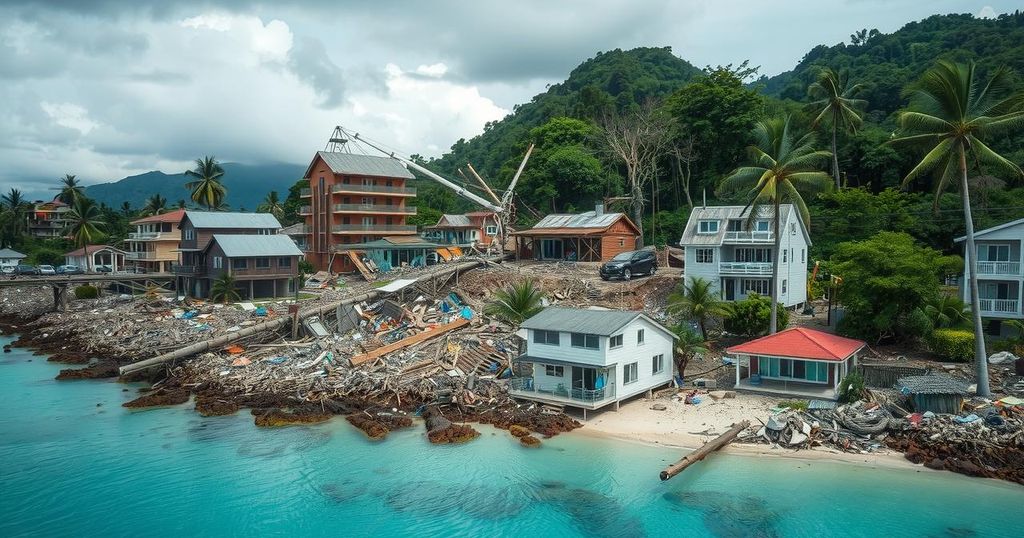Devastating Impact of Cyclone Chido and Vanuatu Earthquake on Vulnerable Communities
Tropical Cyclone Chido and a powerful earthquake in Vanuatu have caused extensive damage and loss of life in affected regions. Cyclone Chido, impacting Mayotte, Comoros, and Mozambique, resulted in high winds and storm surges that devastated communities, particularly vulnerable populations. Direct Relief is actively providing urgent medical assistance and support to address immediate healthcare needs and long-term recovery in the wake of these disasters.
Over the previous weekend, Tropical Cyclone Chido wreaked havoc across the Mayotte archipelago, Comoros, and Mozambique, resulting in extensive destruction and significant loss of life. Shortly thereafter, a powerful 7.3-magnitude earthquake struck the Pacific nation of Vanuatu, further exacerbating a series of calamities affecting already vulnerable communities. Cyclone Chido, deemed the strongest storm to impact Mayotte in over nine decades, generated wind speeds exceeding 140 miles per hour and imposing storm surges reaching 28 feet. These forces obliterated numerous neighborhoods, particularly informal settlements occupied by undocumented migrants. While the confirmed death toll in Mayotte stands at 22, it is anticipated that casualty figures will continue to climb as post-disaster evaluations proceed.
In Comoros, the repercussions of Cyclone Chido mirrored those in Mayotte, with powerful winds and torrential rainfall causing widespread devastation throughout the islands. The President of Comoros, Azali Assoumani, publicly declared a week of mourning for the deceased and indicated that significant damage to the nation’s infrastructure was evident. Mozambique, a nation already susceptible to extreme weather, bore the brunt of Cyclone Chido as it made landfall in Cabo Delgado province, producing winds exceeding 160 miles per hour alongside torrential rains that severely impacted homes and health facilities.
Direct Relief is actively working to assess the needs of the affected populations. In Mayotte, the organization is communicating with French emergency response agencies to identify avenues for supporting immediate healthcare necessities. In Comoros, Direct Relief is collaborating with Santé Diabète, a French non-governmental organization dedicated to diabetes prevention and care, to evaluate conditions and render support. Concurrently, outreach to Mozambique’s Ministry of Health is in progress, with Direct Relief prepared to provide emergency medical supplies and logistical assistance as the extent of damage is clarified.
Meanwhile, following the earthquake in Vanuatu, assessments of damage are ongoing. Initial reports suggest widespread destruction of residential, public infrastructure, and healthcare facilities, compounded by continued aftershocks. Direct Relief is coordinating with healthcare partners in Vanuatu to establish urgent needs, with plans for an emergency shipment of medical supplies scheduled to arrive within the week.
Natural disasters like cyclones and earthquakes pose both immediate and enduring threats to human health. They are known to cause mass casualties and injuries as well as infrastructure failures that can overwhelm local health systems. In addition to immediate challenges, affected communities may encounter further risks, including:
1. Disease Outbreaks: Cyclone-induced flooding can contaminate water supplies, leading to increased transmission of cholera and malaria.
2. Displacement: The destruction of homes and health facilities can force populations into overcrowded shelters, heightening the likelihood of communicable disease transmission.
3. Chronic Health Disruptions: Individuals requiring chronic disease management, such as those afflicted by diabetes, may face interrupted care.
4. Maternal and Infant Health Risks: Disruptions in healthcare services can jeopardize the health of pregnant women and infants, hindering access to emergency obstetric care.
Direct Relief strives to mitigate these challenges by ensuring that essential medical supplies—ranging from trauma kits to vaccines—reach frontend healthcare providers promptly.
Direct Relief is committed to disaster response, drawing from a rich history of aiding during significant global natural calamities. Following Cyclone Idai in 2019, the organization provided over 100 tons of medical aid across Mozambique, Zimbabwe, and Malawi. In Vanuatu, Direct Relief has maintained support for health systems over the years, delivering emergency supplies following previous cyclones and earthquakes. By pre-emptively positioning resources and aligning with local healthcare providers, Direct Relief guarantees that communities receive critical medical assistance when calamities arise.
In recent instances, Direct Relief has offered substantial support in response to crises such as the 7.8-magnitude earthquake in Türkiye and Syria in February 2023, delivering over 1,000 tons of medical assistance to frontline responders. The organization has also provided essential medical supplies in the aftermath of previous earthquakes in Nepal and Haiti, while consistently responding to cyclones, typhoons, and hurricanes across the globe.
As the fallout from Cyclone Chido and the earthquake in Vanuatu continues to develop, Direct Relief is dedicated to ensuring that healthcare providers on-site receive the necessary support to assist communities effectively, thereby facilitating recovery and access to life-saving medical care for those in urgent need.
Philanthropy remains a vital aspect of disaster response. The willingness of individuals to donate can significantly impact the timely and effective provision of necessary medical assistance, reinforcing the notion that giving is good medicine.
The article highlights the recent natural disasters caused by Tropical Cyclone Chido and a subsequent earthquake in Vanuatu, emphasizing the devastating impact on communities already facing socioeconomic vulnerabilities. Cyclone Chido, the most potent storm in Mayotte in nearly a century, significantly affected neighboring regions, resulting in widespread destruction and loss of life. Similarly, the earthquake in Vanuatu introduces additional challenges to affected populations. The sustained efforts of humanitarian organizations like Direct Relief are critical in providing immediate healthcare assistance and long-term recovery support during such crises.
In conclusion, Tropical Cyclone Chido and the earthquake in Vanuatu have precipitated severe humanitarian crises, requiring immediate and ongoing response efforts. Direct Relief’s extensive commitment to disaster response positions it to support affected communities by delivering crucial medical supplies and services. The organization’s proactive approach, combined with public generosity, is essential in facilitating recovery and ensuring that vulnerable populations receive the care they urgently need in the aftermath of these disasters. The continuous evaluation of needs and coordination with local health providers will be paramount as these communities work towards recovery.
Original Source: www.directrelief.org




Post Comment